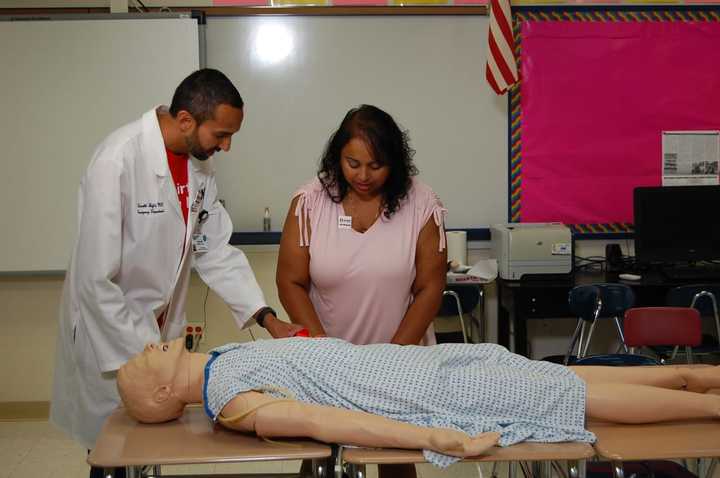Teachers, administrators, and staff in White Plains schools have been trained to administer life-saving first aid to stop someone from bleeding and the district is now equipped with "Stop the Bleed" kits, thanks to White Plains Hospital.
The initiative is part of the Stop the Bleed national awareness campaign to initiate grassroots efforts to encourage civilians to get trained and equipped to help in a bleeding emergency before the ambulance arrives.
Community members, schools and organizations can all receive the training at the hospital so more citizens can help victims in a traumatic incident before help arrives.
The crucial training to save lives is important for everyone in the community said Dr. Farrukh Jafri is the assistant director of Education and Simulation , Emergency Department at White Plains Hospital.
"Stop the Bleed has proven to be an effective, simple procedure that could save someone’s life. I’d say if you have the opportunity to learn to Stop the Bleed, jump at it," Jafri said.
These skills can help trained citizens to aid anyone who’s been injured in an accident, whether it happens in a school or not. "Knowing what to do in the event of a bleeding emergency could mean the difference between life and death," he continued.
While there is no readily available data, and much of the benefits from Stop the Bleed come from anecdotes from health professionals and law enforcement after events that have taken place.
"We know from the Boston Marathon bombing and the Las Vegas shooting that there was tremendous support from the local community to jump into action and assist those in need," Jafri said.
"We have seen the benefit of this program at the Tree of Life shooting in Pittsburgh as well as the Santa Clarita shooting, to name just a few. When tragedy occurs, the community responds. Stop the Bleed gives the community advanced tools and training to make even more of a difference. The more people we train, the higher the likelihood that these skills will be used in a time of need," Jafri said.
Bleeding control kits will be available in White Plains schools throughout the district and will be placed near defibrillator units already commonly available in schools. The kits have tourniquets and wound packing equipment, and are designed to help save lives in the event of a bleeding emergency.
Recognizing this as the next level of school emergency preparedness, White Plains Hospital and the White Plains School District have teamed up to provide ongoing Stop the Bleed training to its staff through simulations using high fidelity mannequins.
Jafri runs the education and simulation program for White Plains Hospital and he’s been instrumental in bringing the training and providing Stop the Bleed kits to schools and other community organizations.
The training led by Jafri was for teachers, administrators, and staff in 2019 and was followed up with skills assessment using the mannequins.
Being able to control bleeding is an advanced form of first aid, Jafri said.
"The chance of a mass casualty event or active shooter incident is very low. However, the chance of a motor vehicle or workplace accident, or a fall or injury is higher. Stop The Bleed focuses on identifying and being able to act on certain life-threatening bleeds."
More people having this skillset better protects the community, Jafri noted. "For someone who runs a large public organization, this is an opportunity not only to have your staff trained but also to purchase a Stop the Bleed kit and have it placed next to your AEDs, which is what many organizations have begun to do."
Stop the Bleed doesn’t replace CPR. Stop the Bleed is for bleeding emergencies, whereas CPR is for cardiac arrest. CPR is critical and data demonstrate that survival is much higher if bystander CPR is initiated. However, they are both important, easily learned skills that empower you to assist those in need and make a difference, Jafri said.
"The course is for one hour and will teach you what you should do when such an injury occurs. Even just waiting five minutes for help to arrive can be critical to survival for a life-threatening bleed. This program will empower everyone to know what to do and how to act while waiting for help to arrive."
Courses are held regularly at White Plains Hospital for community members, schools and organizations. For information, email Jamie Bocchino at jbocchino@wphospital.org
"Many of our teachers and support staff, including nurses and administrators, are trained in Stop the Bleed," said Joseph L. Ricca, superintendent of the White Plains Public Schools.
The training was voluntary and the response from the staff "has been very positive." There are no plans at present to train students.
"Learning Stop the Bleed skills are akin to learning CPR or the Heimlich maneuver. It’s a set of steps that can be easily learned and could help save a life when a traumatic event or life-threatening injury occurs," Ricca said.
While there have been no traumatic bleeding incidents in the schools, "It’s another great tool to have at our disposal to safeguard the health of everyone in our schools. Currently we have Stop the Bleed kits in nurses’ offices in every school in the district. We hope to continue to expand this effort so that we can have Stop the Bleed kits alongside the AED machines in each building," he continued.
The training is a "proactive, education-focused program that reflects the next level of emergency preparedness in schools," Ricca said.
"Hopefully, we’ll never have to use it, but it’s important to have skills like this to save a life anywhere, not just in our schools."
Click here to follow Daily Voice Bridgeport and receive free news updates.

